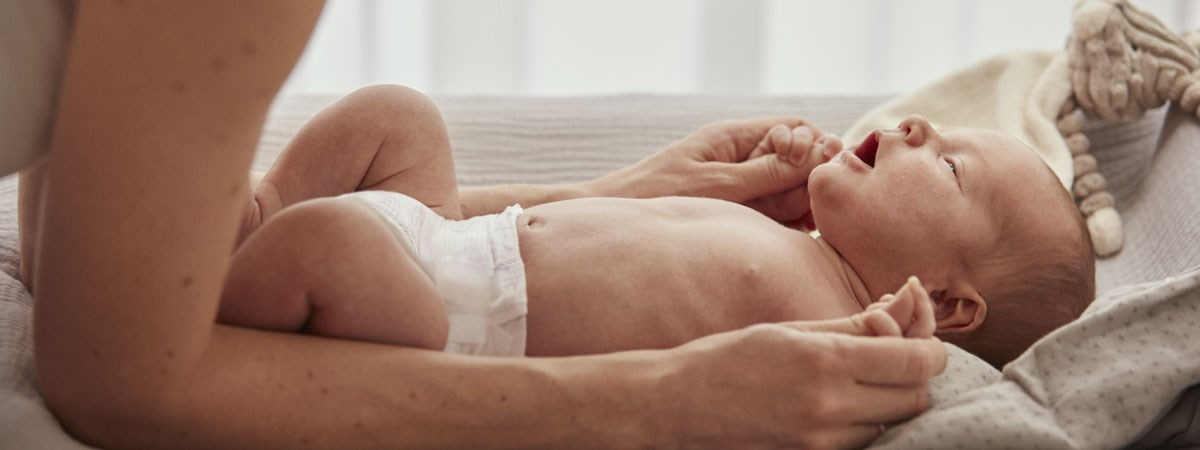Your paediatric centre and infant vaccination
What does a paediatric centre do and what illnesses are covered by the Swedish child vaccination programme?
The staff at the maternity clinic will tell you which paediatric centre you belong to. If you are a first-time mother, you will probably be offered a home visit from a paediatric nurse. Otherwise you should call the paediatric centre yourself after the baby is born to make an appointment.
Visit your paediatric centre to get support and advice
Going on regular visits to your paediatric centre keeps you and your baby safe. It also makes a pleasant outing, and your baby will gradually start appreciating seeing the other babies in the waiting room. Both parents are welcome to attend the appointments. Come together if you both have time.
Read about infant reflexes, your baby's motor development, the crucial bonding process and sensory and brain development.
To begin with, most parents visit the paediatric centre about once a week. The baby will be weighed and measured to check that it is growing normally. The nurse can answer questions and offer advice about things such as breastfeeding, sleep, baby care, any skin problems and childhood illnesses. After a few months, your visits will become less frequent if your baby is developing normally.
Examinations and visits to the doctor
You usually have your first doctor's appointment when the baby is 6 to 8 weeks old. Among other things, the doctor will check your baby's reflexes, heart and lungs.
After that, your baby will be called for examinations at the following ages:
• 18 months
• 3 years
• 4 years
• 5 ½ years
You will normally visit the doctor a few more times during these years.
Vaccination against nine illnesses at the paediatric centre
At the age of 3 months, your baby will start the child vaccination programme that all Swedish children are automatically offered at the paediatric centre.
Vaccines against several illnesses are often given in the same injection.
• 3 months: First vaccination against diphtheria, tetanus, whooping cough, polio, Hib and pneumococcal disease.
• 5 months: Second vaccination against diphtheria, tetanus, whooping cough, polio, Hib and pneumococcal disease.
• 12 months: Third vaccination against diphtheria, tetanus, whooping cough, polio, Hib and pneumococcal disease.
• 18 months: First vaccination against measles, mumps and rubella.
Hib is an abbreviation of haemophilus influenzae, a bacteria the causes ear infection and pneumonia.
The Swedish child vaccination programme now also includes a later vaccination against HPV and cervical cancer for girls aged 11-12 years.
TBC and hepatitis vaccine at the paediatric centre – for some children
At the age of 6 months, some infants are offered free vaccination against TBC (tuberculosis).
On three occasions – at the age of 3, 5 and 12 months – some infants are offered free vaccination against hepatitis B. This depends on specific circumstances and where you live.
These vaccinations are primarily given to infants whose parents originate from countries where tuberculosis and/or hepatitis are common, and to infants that risk being infected by family members.
Extra vaccinations – before travelling or for specific reasons, not provided by the paediatric centre
There are other vaccines that are not covered by the free child vaccination programme. They can be given at the parents' request, before travelling or for specific medical reasons.
The parents must pay for these vaccinations. Your baby can be vaccinated at a healthcare centre or vaccination centre.
• Hepatitis A. Vaccination from the age of 1 year. Given in two doses, e.g. before travelling.
• Chickenpox. Vaccination given for special medical reasons.
• Meningitis. Vaccination is offered to the public in some countries but not in Sweden.
• TBE. Vaccination against tick-borne encephalitis (TBE) can be given to infants who live in an area with a high risk of TBE infection from ticks.
• Influenza. Vaccination can be given if there are special medical reasons for it, or at the parents' request.
• Severe diarrhoea. Vaccination against rotavirus, the most common cause of diarrhoea, can be given from the age of 6 weeks.
Read more about high temperatures in small children.
Read more about vomiting and diarrhoea.

